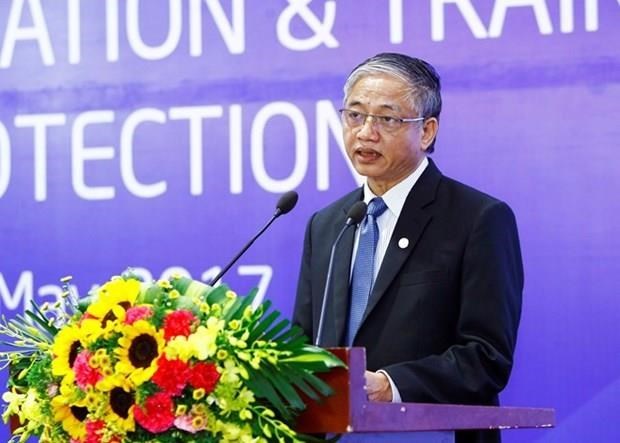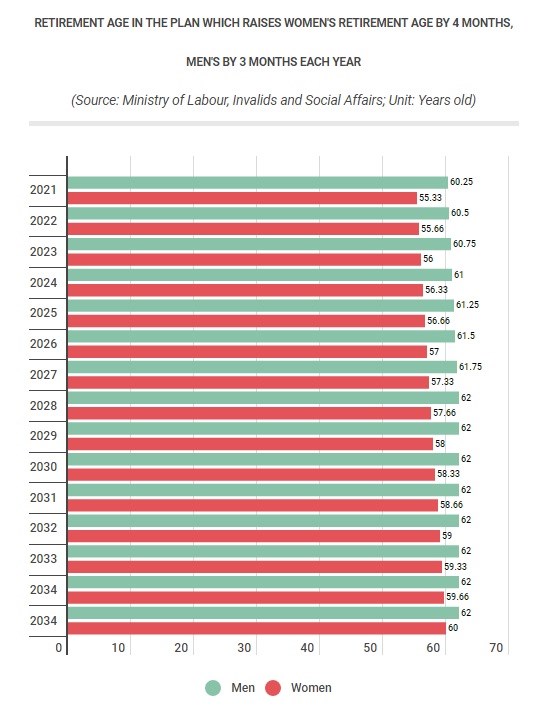MoLISA puts forth solutions to ease impacts of retirement age hike
Deputy Minister of Labour, Invalids and Social Affairs Doan Mau Diep has shared foreign nations’ experiences in keeping elderly employees to work in schools factories, and even leadership positions.
 Deputy Minister of Labour, Invalids and Social Affairs Doan Mau Diep (Photo: VietnamPlus)
Deputy Minister of Labour, Invalids and Social Affairs Doan Mau Diep (Photo: VietnamPlus)Hanoi (VNA) – Deputy Minister of Labour, Invalids and Social Affairs Doan Mau Diep has shared foreign nations’ experiences in keeping elderly employees to work in schools and factories, and even leadership positions.
The draft revised Labour Code was submitted to the National Assembly for comments, under which the retirement age will be raised in accordance to the roadmap. Many lawmakers voiced their concerns over the increase in the retirement age as many young people have found it hard to seek jobs and the healthy longevity of Vietnamese people is not high.
Deputy Minister of Labour, Invalids and Social Affairs Doan Mau Diep, deputy head of the draft revised Labour Code compilation board, cleared up several concerns over the issue while talking with the press.
Reporter: Some voiced their concerns that the life-span of Vietnamese people is high but the number of their healthy life years remains low so is it reasonable to increase the retirement age? What is your of assessment of this opinion?
Deputy Minister Doan Mau Diep: Many people are worried that the longevity of Vietnamese people has increased but the number of healthy life years after the age of 60 is low. That is a wrong judgment as statistics of the World Health Organisation (WHO) showed that it is proud of the healthy life years of Vietnamese people.
In the rankings of healthy life years after 60 years of age made public by WHO in 2016, Singapore ranked first with 22 years out of 183 countries around the world, while Vietnam came 41st with 17.2 years.
In Asia, Vietnam ranked 5th just behind Singapore, Japan, the Republic of Korea and Israel. This showed a good result in the Party and State’s people healthcare policy.
Reporter: For special jobs such as kindergarten and primary teachers and workers directly involved in production, they find it hard to work until 60 and 62 years old, how this issue should be dealt with?
Deputy Minister Doan Mau Diep: This is really a challenge. The reform of social security policy, including the retirement age, requires a great political resolve and consensus of most employees and businesses, and of course, it cannot satisfy all. Moreover, there are always exceptions that require appropriate settlement methods. When it comes to the particularity, I think not only Vietnam has specific labour but any country has, for example, kindergarten and primary teachers.
 An elderly teacher at a kindergarten class (Photo: VNA)
An elderly teacher at a kindergarten class (Photo: VNA)Many nations held that there are many problems need to be dealt with in schools besides teaching. For example, there are hyperactive and autistic children as well as children with language and cognitive impairments. A number of parents want to take their children to kindergartens early and pick them up late, while others wish to send their kids to kindergartens in flexible time due to their working conditions.
The education sector must take part in by re-organising its workforce and jobs to meet diverse demands of children and their parents so as to improve the quality of education.
For workers directly involved in production, many people voiced their concerns that businesses do not want to employ elderly workers instead of young labourers because they cannot achieve high productivity.
For most of enterprises, the most important issue is costs. The unemployment insurance policy does not only support unemployed workers but also help firms to maintain their workforces and avoid dismissing employees.
The Unemployment Insurance Fund can be used to help businesses re-organise and continue using middle-aged and elderly workers by providing part of their wages or paying social insurance in order to reduce costs for enterprises like in many other countries.
If businesses are assisted to reduce costs, they are willing to employ elderly workers, especially amid labour shortages. We estimated that the Unemployment Insurance Fund has a surplus of around 70 trillion VND (over 3.01 billion USD). If each elderly worker is provided with 500,000 VND per month, only 3 trillion VND allocated from the fund per year can help 500,000 labourers continue to work, thereby producing goods and services and fostering the country’s growth.

Reporter: The maintenance of many elderly workers will take the place of young labourers. What is your assessment of this concern?
Deputy Minister Doan Mau Diep: In fact, a number of people have voiced such concern, but we should come back to the first reason for increasing the retirement age to cope with the aging population. Fifteen years ago, the country’s workforce had an additional 1.2 million labourers per year, but over the past five years, the workforce saw a rise of just 400,000 workers per year. After 15 years when the country accomplishes the roadmap for increasing the retirement age, only 200,000 or less will be added to the workforce. It means that Vietnam will face labour shortages if the retirement age is not adjusted promptly.
It can be said that elderly workers may slow down the youth’s participation in the labour market, but the judgment ‘taking the place’ should be considered carefully.-VNA













